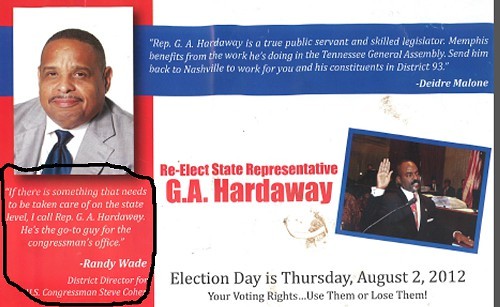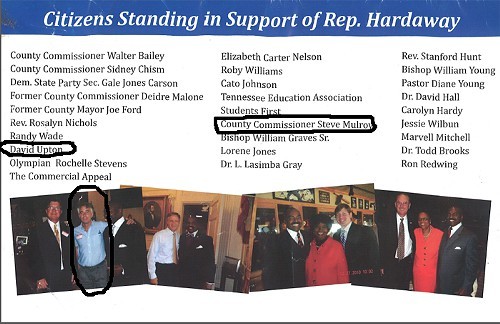Bianca Phillips reports on a group of homeless people who are organizing to change their lives — and public perceptions.
Month: August 2012
A campaign flyer for state Rep. G.A. Hardaway, one of the candidates in the hotly contested House District 93 Democratic primary race, drew attacks Wednesday from U.S. Rep. Steve Cohen as “not honest,” while backers of state Rep. Mike Kernell, Hardaway’s opponent, say their names were used without permission in the flyer.
At a press conference held at Cohen’s headquarters, longtime political activist David Upton and Shelby County Commissioner Steve Mulroy, both self-described supporters of Kernell, disputed the flyer’s use of their names as alleged endorsers of Hardaway. Mulroy also noted that his image was used in the flyer without permission.
Meanwhile, Cohen, whose voice was carried by telephone hookup from Washington, where Congress is still in session, conveyed his displeasure not only at Hardaway’s improper listing of Upton and Mulroy as Hardaway supporters but indirectly expressed dissatisfaction at the flyer’s use of a flattering description of Hardaway by Randy Wade, Cohen’s own right-hand man in Memphis. The congressman reiterated that he is a vigorous supporter of Kernell, whom he formally endorsed, along with several other candidates, at a press conference last month.
The quotation from Wade, who is identified as “district director for U.S. Congressman Steve Cohen,” appears in the flyer under a picture of Wade. It says: “If there is something that needs to be taken care of on the state level, I call Rep. G.A. Hardaway. He’s the go-to guy for the congressman’s office.”
Cohen did not expressly condemn or deny Wade’s statement, but he made a point of saying that he tried to maintain “good relations” with all local public officials and that “I probably talk to Mike more than any other person in Nashville.” Kernell said, “Steve works with everybody. I talk with him day and night. There’s no one ‘go-to’person.”
Concerning the flyer as a whole, Cohen said, “When people are not honest, it disparages the whole system.” He noted that the flyer contains images of two deceased former members of the state House, Ulysses Jones and Larry Turner. “I don’t think they take a position in the race,” he said.
Mulroy said explicitly, “I just want to make absolutely clear I am not endorsing G.A. Hardaway over Mike Kernell in this race,” adding later that he and Hardaway had been mutual supporters in other campaign seasons and supposed that “an assumption was made that was not warranted” about his probable support of Hardaway this time. Political protocol was “to ask permission on a campaign-by-campaign basis.” Mulroy made it clear that he was supporting Kernell in the present race, giving Kernell major credit for helping get his own political career started.
Upton noted, “I’m listed on here….I’ve endorsed G.A. in other races. I’ve contributed to
G.A. some, but I’m supporting Mike this time.”
Kernell talked about his “disappointment…when someone takes too much liberty.” Asked if he wanted to talk with Hardaway about the matter, he said, “I assume one of us will call the other tomorrow night,” getting a laugh.
Asked to respond later on, Hardaway insisted on giving a “case-by-case” reaction. Somewhat confirming Mulroy’s account, he acknowledged a mistake. Apparently, he said, someone on the staff of Malone Carter, the campaign consulting firm that compiled the names on the flyer, had mistakenly listed Mulroy, who, as the commissioner himself had indicated, had endorsed Hardaway in previous races. Hardaway said Mulroy had received an apology.
The case of Upton was different, according to Hardaway, and amounted to a “co-endorsement” of both himself and Kernell. He said Upton had expressly indicated his support as recently as during a lunch last week.|
Hardaway was critical of Cohen, saying, “He can’t bully me. If he spent less time fighting with other Democrats, we’d be in control of the county and the state. When was the last name he had a fight with a Republican?”


Chick-Fil-A Irony Alert
South Carolina senator Lindsay Graham shows his support for “Let’s Eat Chick-Fil-A to Show Our Hatred of the Gays Day.” Looks a little uncomfortable, doesn’t he? Can’t imagine why.

On the other hand, these two look entirely comfortable.

About That Sudden CK’s Closing
Susan Ellis talks to the owner of seven closed CK’s Coffee Shops about why he did it — and why so suddenly.
A Weird Election
John Branston says the August 2nd election feels weird. Let him count the ways.
“To those employees, I’m sorry. I wish we could keep it going,” says Jerry Vela, regarding the sudden closing of 7 CK’s Coffee Shops.
Vela and brother-in-law Randy Gross took over several locations of the coffee shop chain in June 2010. On Sunday, July 29th, after the first shift, they closed the coffee shops for good. (There are three locations that Vela and Gross do not own that remain open.)
Both Vela and Gross are unhappy with coverage of the closings, particularly an article in the Commercial Appeal and an interview with an employee on Channel 3.
They say they closed on Sunday without notice to their employees to avoid theft. Gross says the move was to protect assets and was not malicious.
Going over his time with CK’s, Gross says, “The first year was great.”
Schools Snooping
So The Commercial Appeal is willing to go to the wall before divulging the names of anonymous commenters to attorneys for the Shelby County Commission.
Another reminder that it’s not only the glamour or the pay or the easy dress code, print journalism is just so ennobling.
What’s that famous saying? I disagree with what you say, but I will defend to the death your First Amendment right to say “you suck,” spread rumors, and use as many fake names as you can invent until they pry your cold, cold fingers from your keyboard.
Facebook, of all things, offers a practical solution to commenting with accountability that is used by several newspapers including The Tennessean in Nashville. But that cuts down on clicks and drives commenters who crave anonymity to other websites. This business isn’t dying for nothing.
Accountability, one commissioner noted, has a chilling effect on commenters. Yes, it does. It’s why the commission and other public bodies require speakers to identify themselves and limit their remarks to two or three minutes. And why letters to print newspapers are signed and verified. And why reporters value accuracy and are careful about slamming people who can come visit them or might run into them on the street.
The snoopiness of the subpoena is not so much the problem as the futility of it. What, exactly, is the end game of the pending federal court case asserting that municipal school systems are racially motivated?
As the county commission’s brief says, under the Unified Shelby County School System, there will be approximately 153,000 students if there are no breakaway school systems. The student demographics will be 70 percent black, 22 percent white, 5 percent Hispanic, and 2.4 percent other races and nationalities.
“The Shelby County Municipal School Acts will affect these demographics in a racially discriminatory manner, creating racially homogenous school districts in the municipalities,” the brief says.
The assumption is that the school district demographics would mirror the demographics of each municipality, because those are the only students they would be legally authorized to educate. Germantown, for example, would be 90 percent white and 10 percent minority. In fact, Germantown and other suburban schools educate students from unincorporated parts of the county or neighboring suburbs, boosting their minority enrollment.
It is Memphis, of course, that has mostly one-race schools, because there are only some 9,000 white students in the system. That is the result of 40 years of white flight after court-ordered busing. There are 25,000 white students in the county system.
Municipal school systems, the county commission says, “would create predominately Caucasian schools in those municipalities” and leave the unified district predominately black, very much like the current Memphis system.
Anyone up for some judicial rebalancing? That would mean sending students all over the county. Suburban rebalancing only? Then there would be 100,000 students in former Memphis schools robbed of their constitutional right to be educated in a racially integrated system. How much segregation is acceptable?
No judge in the country can come up with a “solution” to resegregation. Municipal school systems, assuming voters approve them this week, are more likely to be derailed by the other federal court case in September on the constitutionality of the state law.
Municipal schools and private schools are not the only escape hatch from the unified system. Charter schools are gaining strength in Memphis and Nashville under a state department of education that equates charters with “reform” and a change in state law that clears the way for any child to enroll. Last week, the state board of education overruled the local school board in Nashville and approved a new charter school in a middle-class area. I had no idea this was a big deal until I read about it in The Wall Street Journal.
None of this — the subpoena or the federal court cases — will advance the transition to a unified school system by August 2013. An able and willing superintendent, John Aitken, is waiting in the wings while the school board decides how it will do a search. The transition plan lacks the votes and leadership on the 23-member school board needed to implement its cost-cutting proposals. No wonder. As every member knows, a year from September, the 23-member board will become a seven-member board, which the county commission could expand to a 13-member board.
There’s an accountability issue, sort of like those anonymous commenters.
Thoughts on the Eve of the Election
Weird. That’s how this election feels. Let me count the ways.
It’s really important and really interesting how the suburbs vote on municipal school systems. The How Much Do They Hate Us Meter. Driving through Germantown and Collierville last Sunday, I saw lots of “Vote Yes” signs but no signs of organized opposition to what is, among other things, a self-imposed tax increase of an unknown amount. If I were a suburban parent of school-age children at, say, Houston High School (in which case I would need a lot more money to afford a house in the ‘hood), I would be torn between smaller-is-better and “is this even necessary?”
The election outcome won’t have that feel of finality. The Shelby County Commission gets two more bites at the apple. I like its chances on the unconstitutionality of the state law because it is narrowly drawn to, as its backers plainly said, apply to Shelby County. Judge Mays could so rule, and if he does, that would slow the muni train down but not stop it. The resegregation claim, as I have written, looks like a don’t-go-there for the federal courts. If it comes to trial, the whole country will be watching.
As for that subpoena for commenters’ names, The Commercial Appeal has overplayed its hand. How foolish its editorial writers look, puffing their chests and throwing their arms out of their sockets patting themselves on the back in righteousness. NEVER! We’ll never disclose a secret. Trust us! Two words: Ernest Withers, the FBI informant that The CA outed. There are two times when I have learned the hard way that it is best not to write a column: when full of self-righteousness and when full of anger. Let it pass. Two people mentioned the irony of Withers to me within the last 24 hours.
Weird, too, was voting early. Memphians don’t get to vote on munis. Turnabout is fair play. So I voted in one school board race and a couple of other races. And I still can’t explain the school board “what ifs” and “but thens” to my wife and friends, not that they care much.
Jackson Baker and I were talking about the election and charter schools. Jack made the point that charter schools are not really public schools, they’re more like private schools with public money. There is a concerted effort in the Department of Education in Nashville to vastly expand them. We agreed that it’s the beginning of the end of public education as we knew it in our day and our childrens’ day.
Which leads to the idea of a unified school system, which I supported 18 months ago and had hopes for. Like many others, I knew it was risky (“looking for a fight” as Kriner Cash said), knew the 5-4 school board vote was dependent on lame-duck member Sharon Webb, knew opponents such as Jeff Warren and Kenneth Whalum Jr. spoke from first-hand experience as MCS parents, and knew some suburbanites would bolt. I thought busing for diversity was off the table (as it is), but I underestimated the General Assembly and overestimated merger backers Martavius Jones and Tomeka Hart. They have not been the voices for compromise and school closings and efficiencies I hoped they would be. If all we (Memphians) get is a small property tax decrease offset by an increase in county taxes, it will not have been worth the effort. But to the extent that there is and can be suburban-city mixing, as on the Transition Planning Commission and unified school board, there’s some hope. Diversity in public education has value, but it is more praised in word than in practice.
Every Olympics produces a few oddities and this year there are two contenders for “Best of Show”: the badminton players thrown out for throwing their matches and the Japanese gymnastics appeal complete with a handful of cash.
Badminton is a racquet sport so it’s marginally within the boundaries of this blog. I only wish the offending teams had been playing in something closer to prime time. If anyone has video, I would love to see a link. Apparently the South Koreans, Chinese, and Indonesian doubles teams were so blatantly trying to lose that officials had no choice but to intervene.
In other words, they were not so much punished for not trying, which is impossible to prove, but for being incompetent at not trying, which raises the bar on underperformance, so to speak. The longest rally in one game lasted four shots. I once saw Andre Agassi lose to Luke Jensen in a pro tennis match, and while Agassi was widely thought to have tanked, you certainly could not prove it, and Jensen, one of my favorite players, rightly claimed a career win.
The badminton bunglers were losing to win later on against a weaker opponent. This was a result of the wimpy round-robin format instead of a straight loser-goes-home, winner-moves-on tournament. In other words, the Olympics has descended to the level of club tournaments and kiddie sports where participation for one and all is the guiding rule.
Mark McGwire, Barry Bonds, Lance Armstrong, the South Korean badminton team. One way to raise your profile.
The second special moment, this one captured on television in prime time for all to see, was the Japanese gymnastics coach handing over a wad of bills with his appeal to the governing body of the sport. A bribe? No, more like a performance bond. The appeal was successful.
Is there a lesson for other sports? I think so. Next time a pro football coach throws that appeal hankie, make it come with some cash, and give the opposing coach the right to match or up the offer — within a designated time limit, of course. The Houston Texans meet Texas Hold’Em. And when a team exhausts its appeals, let it buy an additional one for, say, $100,000, to be paid in cash on the spot. The drama would replace what is now just dead air every time we hear the dreaded “the previous play is under review.”
The same rules could apply in tennis. Call it the “Hawk Eye” Pay Per View rule. And in baseball, where the angry manager kicking dust on the umpire has become a cliche. Big-time sports is flush with cash. Put it in play. User fees have become an accepted part of every facet of our lives. It could be one of the lasting lessons of London.
Lunch at Eighty3
Have a vicarious lunch at Eighty3 and learn all the other latest Memphis food scoop at Hungry Memphis blog.


